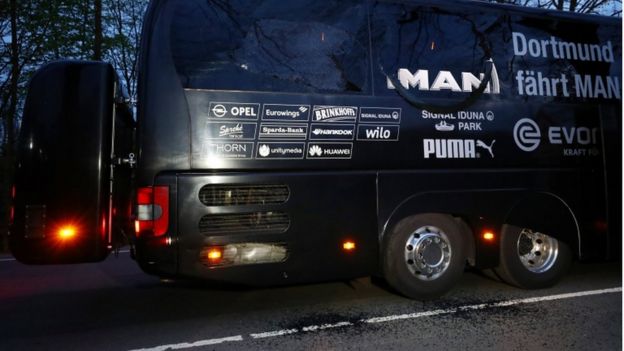BBC News
Police in Germany have charged a man suspected of being behind an attack on the Borussia Dortmund team bus.
Rather than having links to radical Islamism, he was a market trader hoping to make money if the price of shares in the team fell, prosecutors say. The 28-year-old, identified only as Sergej W, was staying in the team's hotel in a room overlooking the street where the explosion took place.
Two people needed medical help after three bombs exploded near the bus. Spanish footballer Marc Bartra underwent wrist surgery and a police officer was treated for shock.
Following the attack on 11 April, Borussia Dortmund's Champions League match against Monaco was rescheduled a day later, which led Dortmund fans to open their doors to stranded away supporters.
Police were originally treating the blast as a terrorist attack after letters were found near the site of the attack indicating links to so-called Islamic State (IS). They arrested a 25-year-old Iraqi "with Islamist links" the day afterwards.
However, the following week, investigators cast "significant doubt" on jihadist motivations being behind it. They said letters found at the scene may have been an attempt to trick people into thinking there was an Islamist motive.
 REUTERS
REUTERS
In a statement on Friday (in German), the German federal prosecutor's office said the 28-year-old, who has German and Russian nationality, had been charged with attempted murder. He was arrested early on Friday near Tübingen in Baden-Wuerttemberg in south-west Germany.
The suspect had allegedly bought options to short-sell 15,000 shares of stock - reportedly priced at €78,000 (£65,000; $83,600) - in Borussia Dortmund. He would have profited from falling share prices after the attack.
He was staying at the team's L'Arrivée hotel in Dortmund on the day of the attack and had moved to a room on the top floor, overlooking the street where it took place, prosecutors say.
The suspect placed the bet on 11 April using an IP address traced to the hotel, after taking out a loan for the money. Investigators believe three explosive devices packed with metal pins were hidden in a hedge and set off as the bus passed.
The bus was damaged about six miles from the Westfalenstadion - officially called Signal Iduna Park - in Dortmund about 90 minutes before kick-off. Pictures from the scene showed the bus's windows broken and tyres burst in the blasts.
Fans at the 80,000-capacity Signal Iduna Park were told to stay there until it was safe to leave but were later evacuated safely. Borussia Dortmund's stock did drop from €5.738 to a low of €5.421 after the attack. Having recovered slightly it slid again after the team was eliminated from the Champions League.
No comments:
Post a Comment